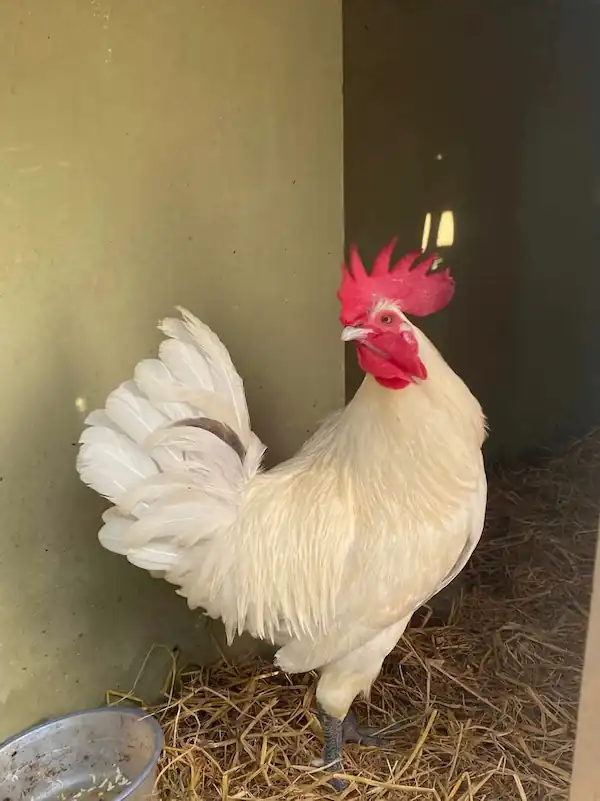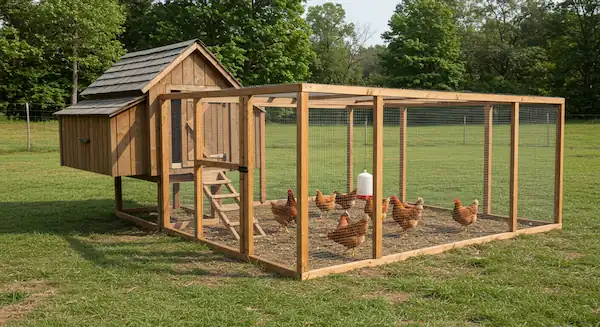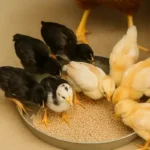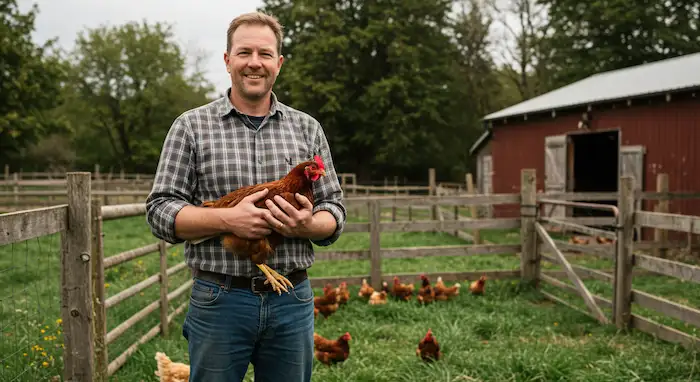Life Expectancy of Chickens
Determining the exact age of chickens can be quite a mystery. With so many different types and breeds available, their lifespans can vary widely. The answer to the question of how long chickens live is not just a number nor just luck. Instead, various factors contribute to their lifespan. For new chicken keepers, estimating the average lifespan of their chickens can be challenging. This guide is here to clear up the confusion.
How Long Do Chickens Live
Chickens have varying lifespans, from under a year to over two decades. This broad range in longevity largely depends on their purpose (meat, egg-laying, or ornamental), their diet, care, and living environment.
Under ideal conditions, backyard chickens can live from 6 to 10 years. They can live even longer if properly raised.
I’ve come across various types of hens and roosters. Some lived up to 2 years, while others lived for more than 5 years. I even have a few that are crossing the 10-year mark. What I’ve come to realize is that the breed of the chicken is the most influential factor in determining its lifespan.
Average Lifespan by Breed
If you’re raising chickens at home with proper care, they can usually live around 3 to 8 years.
Chickens raised for meat or eggs in farms have much shorter lives. Meat chickens often live only 6–9 weeks, and egg-laying hens are often culled after 1–2 years.
| Type | Average Lifespan |
| Cornish Game Hens | up to 4 weeks |
| Cornish Cross (meat) | 6-8 weeks |
| Free-range hybrids | 8–12 weeks |
| Heritage breeds | 15–20 weeks |
| Egg-layers (commercial) | up to 2 years |
| Breeding stock | up to 2 years |
| Backyard pet chickens | 5–12 years |
| Bantams | 10–15+ years |
Best Breeds for Longevity
- Wyandottes
- Plymouth Rocks
- Orpingtons
- Rhode Island Reds
- Australorps
- Ameraucanas
- Modern Game Bantams
- Phoenix, especially in the heat
- Mixes from small breeders or show lines (not hatcheries)

Factors Affecting Chicken Lifespan
If you look at the table above, each chicken breed shows a broad lifespan range. This gap between the minimum and maximum lifespan is mainly due to the different varieties within the same breed, as well as the purpose they are raised for and the level of care they receive. There are certain other factors that play an essential role.
1. Breed and Genetics
Those chickens that are bred for extreme egg output (like ISA Browns, Leghorns) have shorter lives due to reproductive diseases or heart failure. Heritage breeds like Orpingtons, Plymouth Rocks, Rhode Island Reds, and Wyandottes are resilient species, leading to their longer lifespan up to 8-12 years.
Bantam chickens have smaller bodies, which often means lower stress and longer life. Similarly, Crossbreeds or Barnyard Mixes are hardy due to greater genetic diversity.
The breeds known for the shortest life duration are broiler. Since they are meat chickens and purely bred for rapid growth, they often live from 5 weeks up to 1 year or less.
2. Egg Laying
The more a hen lays eggs, the more energy she uses, which can lead to burnout or reproductive illnesses. This, in turn, can shorten her lifespan. Hens that lay less frequently or take seasonal breaks from laying tend to live longer. If your backyard hen lays too many eggs, hormone implants can be used to reduce egg-laying stress. This will stop egg production and may help extend her life.
If you have experience with both hens and roosters, you may have noticed that roosters often live longer than hens. This is because they do not go through the physical strain of laying eggs.
4. Wild vs. Domestic
Free-ranging or wild chickens, like those found in parts of Hawaii or California, rely on their natural instincts to survive. If we talk about their natural lifespan, they actually have the potential to live a long time. In the wild, they eat a natural diet, get plenty of exercise, and live without much stress, all of which can help increase their longevity.
However, there’s another side to the story. These chickens also face a much higher risk of predators such as dogs, hawks, or raccoons, which often causes them to die earlier, sometimes before they have the chance to reach their full natural lifespan.
On the other hand, domestic chickens, which we keep as pet birds, live under human care, which can sometimes go against their natural way of life. They might suffer from stress, limited space, or even obesity. If that’s the case, their lifespan may be shorter. But when human care works in their favor, i.e., proper diet, clean housing, and protection, they can actually live out an ideal, long life.
5. Nutrition
Chickens need different kinds of food depending on how old they are. Chicks need starter feed, growing ones need grower feed, and hens that lay eggs need layer feed. Older chickens even have special senior feed. Giving them the right food at the right time helps them stay healthy.
Chicks need protein-rich foods to grow faster and keep muscles strong. On the other hand, older chickens need softer and easier-to-digest food, such as soaking pellets and fermented grains. Chickens bred for laying eggs need extra calcium to keep their bones strong and avoid issues like egg-binding. Feeds that are rich in calcium are crushed oyster shells or other special supplements.
My backyard chickens eat whatever they find while wandering around the farm. However, I also provide them with a balanced diet, including pellets, access to forage, kitchen scraps, and clean water. Dominant hens often eat more and better, which can potentially lead to longer lives. So, I make sure to offer these items to both my hens and roosters regularly to prevent them from eating debris off the ground.
Don’t overfeed your chickens, as they usually won’t stop eating if food is constantly available. Overfeeding can lead to obesity, which can strain their organs and joints, ultimately reducing their lifespan.
6. Healthcare
Chicken diseases such as prolapse, bumblefoot, Marek’s disease, and tumors are common in both rural and urban areas. Older hens are especially prone to parasite attacks. So, regular deworming and checking for mites or signs of illness is key to improving their longevity. You should also watch for changes in behavior, droopy wings, pale combs, or limping.
Your chicken might fall victim to an epidemic disease, so quarantining the affected bird is necessary to protect the rest of your flock. It’s also a good practice to quarantine any new birds before introducing them to the group. In case of a viral disease, contact a vet. If you don’t have access to one, experienced chicken owners might be able to help with home treatments.
7. A Safe and Comfortable Home
One of the most overlooked mistakes chicken owners make is providing cramped spaces. A clean, dry, and well-ventilated coop helps reduce disease and stress. Make sure there’s enough room in the coop for your chickens to stretch their wings. The outdoor run should also offer plenty of space for them to wander freely. Additionally, ensure your chickens have proper shelter from rain, snow, freezing temperatures, and heatwaves.
You can find more about the space chicken needs in this article.
All you can do to extend the lifespan of your chicken is provide a suitable environment. With ideal conditions and proper protection, chickens can thrive for a decade or more. It might sound like an exaggeration, but my own backyard rooster has been on our farm since 2013. Secure, predator-proof coops and regular supervision are key to keeping your flock both safe and healthy over the years.
How Long Do Chickens Live Before Slaughter?
The chickens raised for meat, called broilers, are usually slaughtered at a very young age of 6 to 8 weeks. They are bred to grow super-fast, sometimes doubling in size every week. If they grow much beyond that, their legs often can’t support their weight. Many start experiencing heart problems, broken legs, or even sudden death after 9-12 weeks. So, they are not allowed to go beyond the 8 or 9 weeks.
Some small-scale or free-range farms allow meat birds to live longer, up to 12 to 14 weeks, for better flavor and texture.
Chickens raised for eggs, like Leghorns or sex-links, usually live longer than meat birds, but they aren’t exactly long-lived either in commercial settings. They start laying eggs when they reach the age of 18-20 weeks. After reaching to 2 years, they slow the production of eggs. So, curled right after that, usually during the age of 12-24 months.
How to Tell Your Hen is Getting Old?
As your hens grow older, they’ll need a little extra care to stay happy and healthy. Just like us, chickens slow down with age, but with the right care, they can enjoy their golden years in comfort.
Below are the common symptoms your hen can exhibit when she is getting old.
- She lays fewer eggs or stops laying completely.
- She rests more and moves around less.
- Her comb and wattles look pale or shriveled.
- Feathers may look dull or fall out.
- She may have stiff legs or trouble perching.
- She eats less or loses weight.
- Her eyes may get cloudy, or her vision might get worse.
Record of Oldest Chicken
The record for the oldest chicken lived was a peanut; a bantam hen reached almost 22 years according to Guinness World Records. The mystery behind his long survival was safety and not laying eggs.
We also heard from everyday chicken keepers who told us about their oldest hens. Some lived 10, 12, or even 15 years. Most of them said the secret was good food, safety from predators, and lots of love.
My own boy Rocky is 12, which is the oldest among our flock, and still loves sunbathing. I feed him frozen pellets, fermented food, and keep her coop highly clean.
Lastly, I’m not here to show off big numbers or personal records, but the goal is to learn from these long-lived birds. If we sum up our entire discussion about a chicken’s lifespan, there are a few things that most long-lived chickens seem to have in common.
- A safe, predator-proof coop
- Consistent care and attention
- Clean living space
- A healthy diet with the right nutrients
- And sometimes, just great genetics








